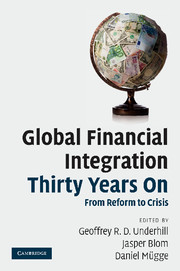Book contents
- Frontmatter
- Contents
- List of figures
- List of tables
- Notes on contributors
- Preface
- Acknowledgements
- List of abbreviations
- Introduction: the challenges and prospects of global financial integration
- Part I History and context: input, output and the current architecture (whence it came)
- Part II Assessing the current financial architecture (how well does it work?)
- 5 Adopting international financial standards in Asia: convergence or divergence in the global political economy?
- 6 The political economy of Basel II in the international financial architecture
- 7 The catalytic approach to debt workout in practice: coordination failure between the IMF, the Paris Club and official creditors
- 8 Empirical evidence on the new international aid architecture
- 9 Who governs and why? The making of a global anti-money laundering regime
- 10 Brazil and Argentina in the global financial system: contrasting approaches to development and foreign debt
- 11 Global markets, national alliances and financial transformations in East Asia
- Part III Does the future hold? Reactions to the current regime and prospects for progress (where is it going?)
- Conclusion: whither global financial governance after the crisis?
- References
- Index
10 - Brazil and Argentina in the global financial system: contrasting approaches to development and foreign debt
Published online by Cambridge University Press: 02 December 2010
- Frontmatter
- Contents
- List of figures
- List of tables
- Notes on contributors
- Preface
- Acknowledgements
- List of abbreviations
- Introduction: the challenges and prospects of global financial integration
- Part I History and context: input, output and the current architecture (whence it came)
- Part II Assessing the current financial architecture (how well does it work?)
- 5 Adopting international financial standards in Asia: convergence or divergence in the global political economy?
- 6 The political economy of Basel II in the international financial architecture
- 7 The catalytic approach to debt workout in practice: coordination failure between the IMF, the Paris Club and official creditors
- 8 Empirical evidence on the new international aid architecture
- 9 Who governs and why? The making of a global anti-money laundering regime
- 10 Brazil and Argentina in the global financial system: contrasting approaches to development and foreign debt
- 11 Global markets, national alliances and financial transformations in East Asia
- Part III Does the future hold? Reactions to the current regime and prospects for progress (where is it going?)
- Conclusion: whither global financial governance after the crisis?
- References
- Index
Summary
Introduction
Over the past decade, Brazil and Argentina have found very different answers to a very similar problem: an excruciating debt burden denominated in a foreign currency, a phenomenon that has haunted a range of emerging market economies over the past decades. While Brazil toed the line prescribed by Washington-based institutions – the IMF in particular – Argentina defaulted on its foreign debt in 2002 instead of giving in to creditor pressure. And while Argentina reacted against the ‘rules’ of the system to carve out its own ‘policy space’ to ease the domestic costs of adjustment and debt workout, Brazil followed the recipe and appeared to suffer (somewhat) greater costs. Two questions follow: how can the highly divergent policy responses of these two countries be explained? And how are the two policy routes to be evaluated with the benefit of hindsight? These are the two central issues addressed in this chapter.
The divergent stories contain possible lessons: first and foremost, they show that the ‘policy space’ available to national economies during financial crises may be greater than is often assumed in the literature or by those who designed the financial architecture. The case of Argentina contradicts common assertions that globalised finance leaves no alternative to ‘orthodox’ policies (see Chapter 11 by Zhang). Second, it shows that following heterodox policies was not only possible, but at least in Argentina's case, probably beneficial: in spite of hardships, Argentina in the end fared slightly better than Brazil.
- Type
- Chapter
- Information
- Global Financial Integration Thirty Years OnFrom Reform to Crisis, pp. 187 - 203Publisher: Cambridge University PressPrint publication year: 2010



